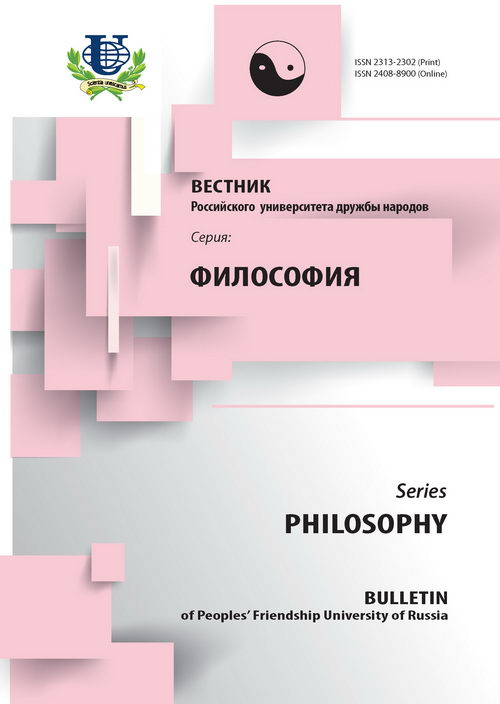No 4 (2014)
- Year: 2014
- Articles: 11
- URL: https://journals.rudn.ru/philosophy/issue/view/702
Articles
Editorial note
RUDN Journal of Philosophy. 2014;(4):5
 5
5


Postmodern and the crisis of civilization
Abstract
In the context of postmodern converted type of communication that defined the emergence of civilization. The development of information communication methods makes communication “mediated-direct”. In these conditions shown two important trends. Firstly, the return begins from abstract forms of understanding the world to visual-shaped, more closely related with emotional and affective sphere of spirituality. Second, beginning in weakened volitional consciousness. These trends, in our view, and represent a fundamental trend of historical development, which will determine the future of human civilization.
RUDN Journal of Philosophy. 2014;(4):6-17
 6-17
6-17


Mythological roots of political ideology
Abstract
In the article are found out a place and a role of a political myth in a modern political reality. The author analyzes mutual relations of political ideology, a political myth and archaic mythology, reconstructs the basic lines of a modern political myth. In the conclusion the question of an archetype of the hero as a basis for construction modern political leaders public images is considered.
RUDN Journal of Philosophy. 2014;(4):18-29
 18-29
18-29


Destiny of philosophy in anticipation of domination of equipment
Abstract
The article shows that philosophy, after losing out its dominance as a form of man's relationship to the world in the 5-7 centuries AD, consistently becomes “a handmaiden of religion” (5-15 AD), and then “handmaiden of science” (18-20 centuries AD). It is also shown that the crisis of scientific rationality (20th century), suggests that science, as the dominated form of man's relationship to the world, is gradually giving their dominance to Technology. This process is manifested in the fact that “the volume of discovered reality” by science ceases to satisfy the needs of man, gives a way to “the volume of the constructed reality” by technology. With the advent of the dominance of technology, philosophy will inevitably come in the position of its maid. However, in a time when science is losing its dominance, and the technology has not been fully acquired it - there is a chance for philosophy to say its new word, as it has been during the change of dominance between religion and science in the 16-18 centuries. In paper presented explicitly three maxims of the religion, science and technology.
RUDN Journal of Philosophy. 2014;(4):30-40
 30-40
30-40


The encephalic processes’ learning: variety of the strategy’s
Abstract
The encephalic processes’ learning is a one of complex problems of modern science. The most important directions on the brain-comprehension phenomenon’s way are the cognitive-informational and the evolutionary-genetic ones. In the context of the first approach, the intellection and the consciousness aren’t the features of the separated brain’s elements, but they appear as like emergent property of the neuronal network. Within the constraints of the evolutionary-genetic approach, the role of the genetic factors in the Central nervous system’s formation is considered on the cellular, morphofunctional and systemic rates. This paper discusses these researches should assure the breakthrough on the way of the encephalic processes’ learning.
RUDN Journal of Philosophy. 2014;(4):41-52
 41-52
41-52


Not theoretical forms of systematization of ideas
Abstract
In article such not theoretical forms of ordering of ideas, as concepts (a floor of the theory), doctrines (quasi theories) and doctrines (pseudo theories) are entered into consideration. The logic of citing with the well-determined syntax and semantics is under construction. Comparison of the constructed logic with other logical systems is carried out. Such operations, as definition (concepts and objects), classification are briefly analysed. Comparison theoretical and not theoretical forms of ordering of ideas is spent.
RUDN Journal of Philosophy. 2014;(4):53-68
 53-68
53-68


Gnoseology aspect of Īçvara-Vāda (the indian teaching of personal God/ Īçvara)
Abstract
The article is devoted to gnoseology aspect of īçvara-vāda or the Indian teaching of Personal God/Īçvara in Hindus Philosophical systems Nyāya and Vaiçeşika. One of the main sources of valid knowledge in Indian Philosophy is anumāņa that is logical inference. Theistic argumentation for God`s being in Indian philosophical tradition according to logical rules is called Īçvarānumāņa. Eminent representative of Īçvarānumāņa Udayanāchācharya in his work ’’Nyāyakusumaņjali’’ elaborated and made a synthesis of Nyāya argumentation for God`s being in his famous eight means of logical demonstration.
RUDN Journal of Philosophy. 2014;(4):69-77
 69-77
69-77


 78-85
78-85


 86-94
86-94


 95-99
95-99


On Our Authors
RUDN Journal of Philosophy. 2014;(4):100-101
 100-101
100-101
















